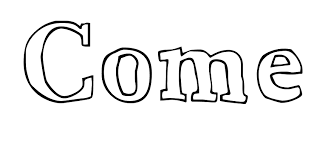come
英 [kʌm]
美 [kʌm]
- vi. 来;开始;出现;发生;变成;到达
- vt. 做;假装;将满(…岁)
- int. 嗨!
- n. (Come)人名;(英)科姆;(阿尔巴)乔梅
使用频率:

记忆方法
将“come”与“come on”短语联系起来记忆,想象某人兴奋地召唤你:“快过来!”(Come on!)这个场景可以帮你记住“come”这个单词的基本含义是“来”或“到达”。
以上内容由AI生成, 仅供参考和借鉴
中文词源
come 来
来自PIE*gwa, *gwem, 来,往,词源同acrobat, base, advent.
英语词源
- come
-
come: [OE] Come is of course one of the basic words of English, and its history goes back to the language’s Indo-European roots. Here its distant ancestor was the base *gwem-, which also produced Greek baínein ‘go, walk’ (related to English base and basis) and Latin venīre ‘come’ (source of a whole range of English words from adventure to venue). The prehistoric Germanic descendant of *gwem- was *kweman or *kuman, which has produced German kommen, Dutch komen, Swedish komma, and English come. The compound become (source of comely) was formed in Germanic in prehistoric times.
=> adventure, base, basis, become, venue - come (v.)
- Old English cuman "come, approach, land; come to oneself, recover; arrive; assemble" (class IV strong verb; past tense cuom, com, past participle cumen), from Proto-Germanic *kwem- (cognates: Old Saxon cuman, Old Frisian kuma, Middle Dutch comen, Dutch komen, Old High German queman, German kommen, Old Norse koma, Gothic qiman), from PIE root *gwa-, *gwem- "to go, come" (cognates: Sanskrit gamati "he goes," Avestan jamaiti "goes," Tocharian kakmu "come," Lithuanian gemu "to be born," Greek bainein "to go, walk, step," Latin venire "to come").
The substitution of Middle English -o- for Old English -u- before -m-, -n-, or -r- was a scribal habit before minims to avoid misreading the letters in the old style handwriting, which jammed letters. The practice similarly transformed some, monk, tongue, worm. Modern past tense form came is Middle English, probably from Old Norse kvam, replacing Old English cuom.
Remarkably productive with prepositions (NTC's "Dictionary of Phrasal Verbs" lists 198 combinations); consider the varied senses in come to "regain consciousness," come over "possess" (as an emotion), come at "attack," come on (interj.) "be serious," and come off "occur." For sexual senses, see cum.
权威例句
- 1. We'll go to a meeting in Birmingham and come straight back.
- 我们将去伯明翰参加会议,然后马上回来。
- 2. Come along, lad. Time for you to get home.
- 来吧,小伙子。你该回家了。
- 3. The news will come as a great relief to the French authorities.
- 这个消息会让法国当局大大松一口气。
- 4. Many of the clothes come from the world's top fashion houses.
- 这些服装中有很多出自世界顶级时装设计公司。
- 5. Don't expect me to come and visit you there.
- 别指望我会去那儿看你。